Module 7 English for you and me Unit 1 Have you ever been to an English corner? 课件
文档属性
| 名称 | Module 7 English for you and me Unit 1 Have you ever been to an English corner? 课件 | 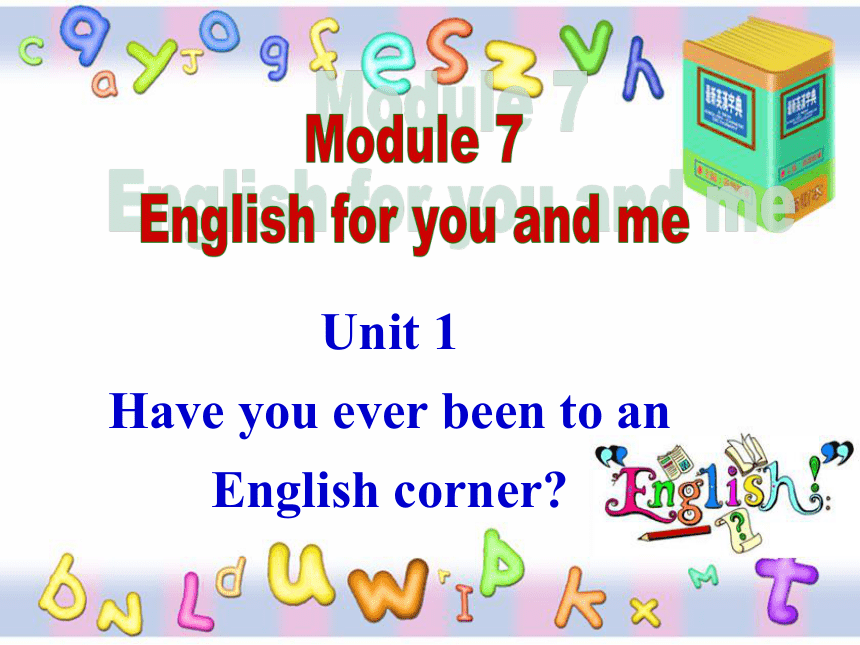 | |
| 格式 | zip | ||
| 文件大小 | 1.6MB | ||
| 资源类型 | 教案 | ||
| 版本资源 | 外研版 | ||
| 科目 | 英语 | ||
| 更新时间 | 2018-01-14 09:42:39 | ||
图片预览

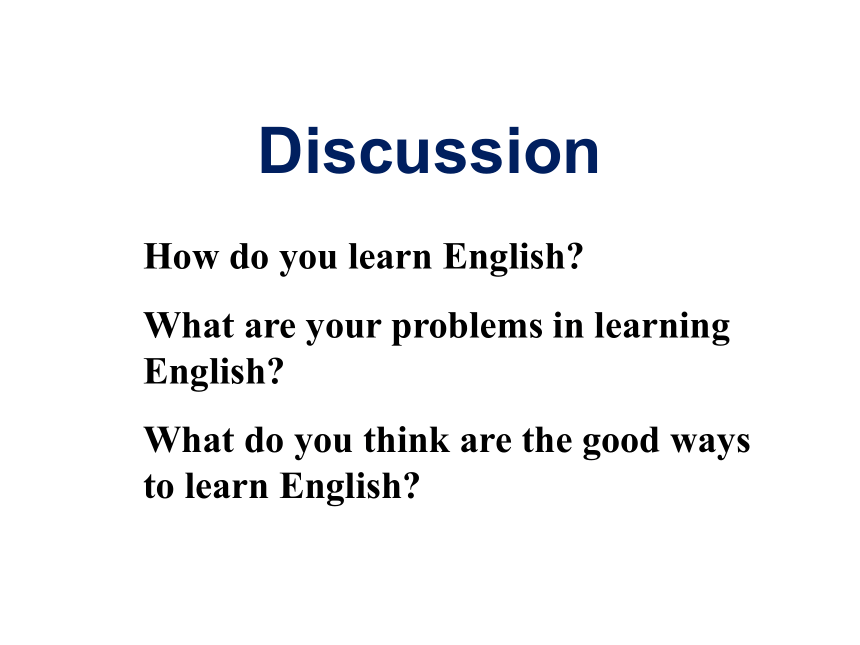
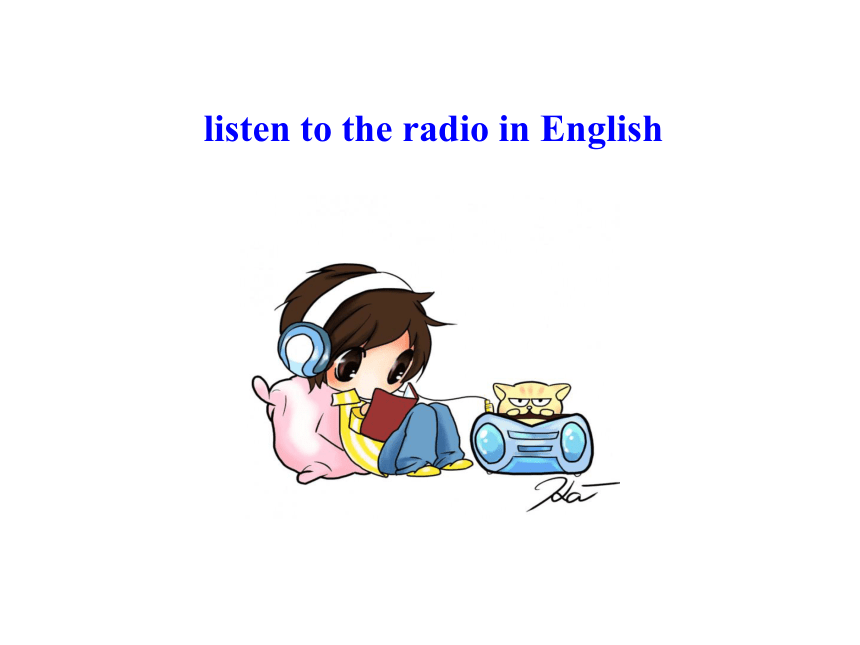



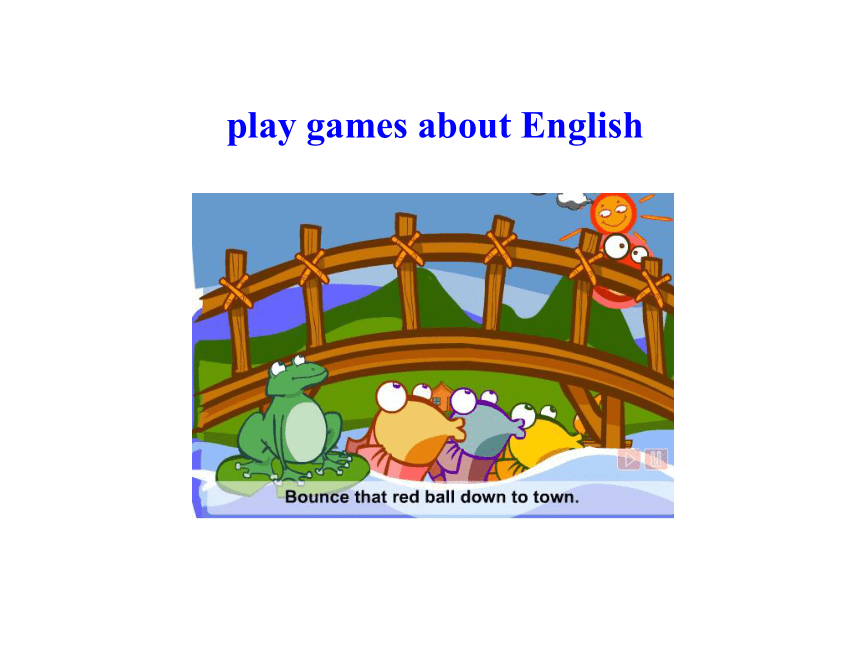


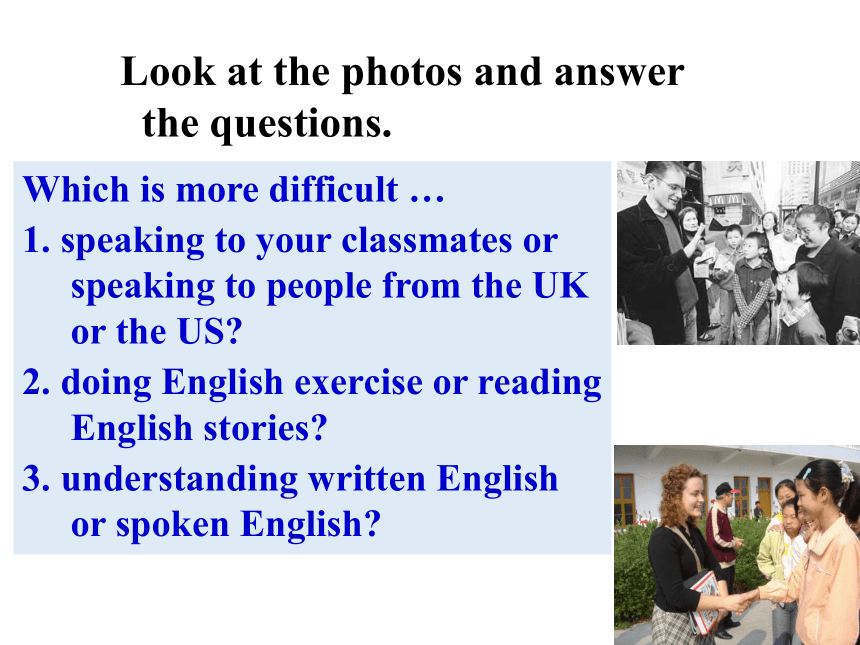
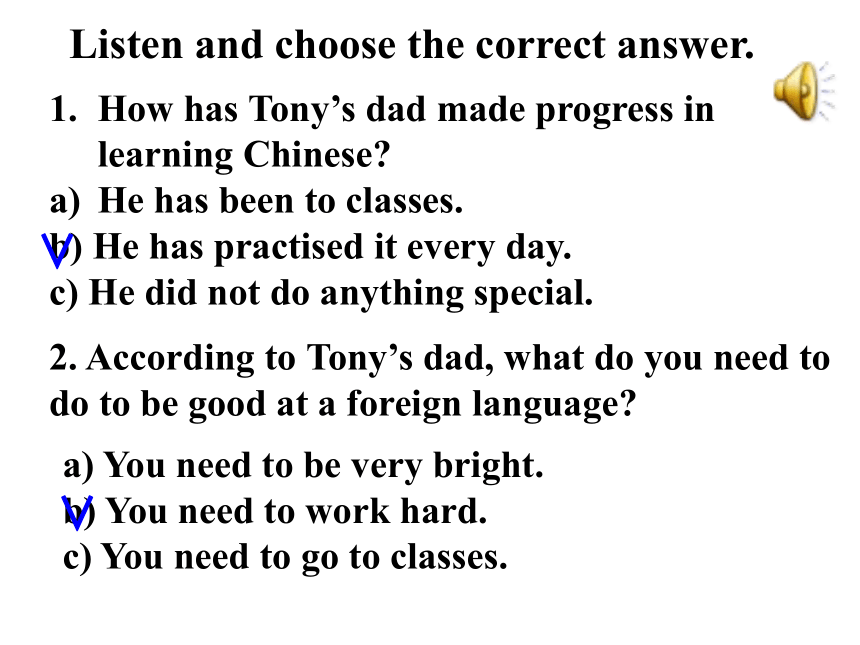
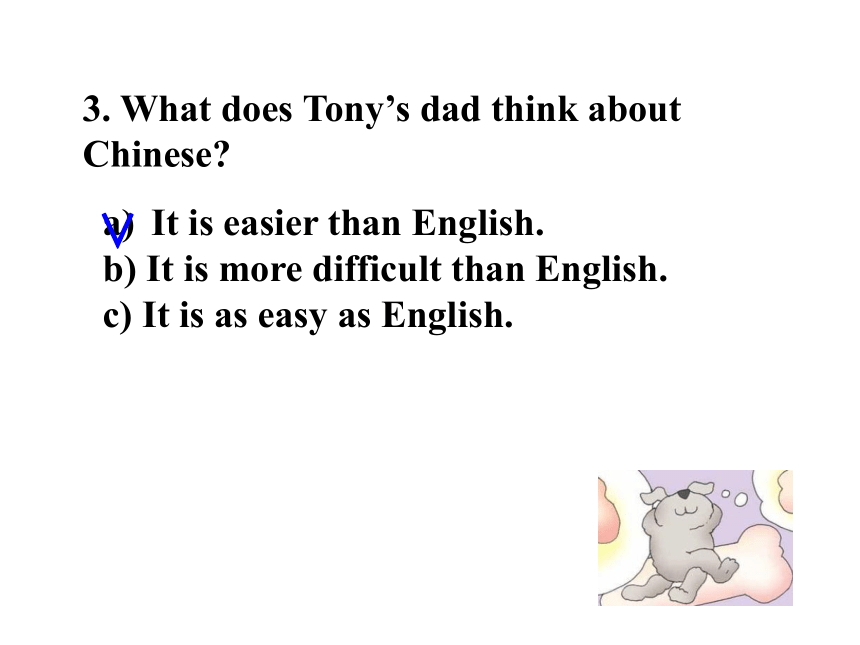
文档简介
课件43张PPT。Unit 1
Have you ever been to an
English corner?Module 7
English for you and meDiscussionHow do you learn English?
What are your problems in learning English?
What do you think are the good ways to learn English?listen to the radio in Englishread newspapers in Englishwatch English filmssing English songsplay games about Englishgo to English cornerDiscussionIs there an English corner in your classroom?
Have you ever been to an English corner? Look at the photos and answer
the questions.Which is more difficult …
1. speaking to your classmates or speaking to people from the UK or the US?
2. doing English exercise or reading English stories?
3. understanding written English or spoken English?How has Tony’s dad made progress in learning Chinese?
He has been to classes.
b) He has practised it every day.
c) He did not do anything special.Listen and choose the correct answer. ∨2. According to Tony’s dad, what do you need to do to be good at a foreign language?a) You need to be very bright.
b) You need to work hard.
c) You need to go to classes.∨It is easier than English.
b) It is more difficult than English.
c) It is as easy as English.3. What does Tony’s dad think about Chinese?∨√√√ Listen again and decide who might agree with the following.√Have you ever been to an English corner? How do you feel? Can it help you to improve your English?1. Some people think English is difficult to learn because ______________________.
2. You’ll find a lot of fun in learning English if ___________________________.
3. You can go to an English corner if
_________________________.
4. It is good to meet other speakers of English, although______________________________.
5. Lingling does not have to go to an English corner because _________________________.you keep trying.you are happy to tryyou didn’t speak English very well.she can speak English with Betty whenever they meet. Read the dialogue and complete the sentences in your own words.it requires too much effort to learn it well.Do you know any other methods to learn English well? Talk about it with your partner.Now work in pairs.Talk about your progress in English.
— Do you think you’ve made any progress
in English this year?
— Yes, I do. I’ve learnt a lot of new words,
although …A: You’re good at English. Could you tell me
how to learn English well?
B: The way to learn English well is to
practice speaking it as often as possible.
A: I think so. Anything else?
B: Try to write a few sentences about your
day and then speak them out as many
times as possible before you go to sleep.
A: Good idea. Thanks. Language points1. Progress n. 进步(不可数名词),常用rapid, great,
much, some等修饰词。
1) make progress 取得进步
make great progress 取得很大进步
How much progress have you made?
2) make progress in (doing) sth 在(做)某事取得进步
I have made great progress in maths this term.
I made rapid progress in speaking English.
2. achieve v. 成功;实现(主语是人) achievement n.
achieve success / victory / one’s dream
取得成功/ 胜利/ 实现某人的梦想
At last, he achieved his dream.
No one can achieve anything without effort.成就come true 主语是梦想、蓝图、计划等。
Your dream will come true one day.
3. anyway adv. 无论如何;不管怎样
Anyway, he must have eaten a lot because now
he is fat.
4. written English 英语书面语
spoken English 英语口语
English – speaking 说英语的
How can I improve my spoken English?
I want to travel to English– speaking countries.5. keep doing sth. = go on doing sth. 继续做某事
6. fun n. 快乐;乐趣 (不可数名词)
have fun 玩得开心
have fun (in) doing sth. 做某事有趣
We had fun in riding our bikes to the beach today.
7. continue to do sth. 继续做某事
continue doing sth.
continue with sth.
8. you mean 你意思是说,你指,用在口语中,用
于核实某人所说的话。
You mean I must finish it before I go home?9. thought 原以为 (但实际并非如此或现在不认为)。
I thought he was honest, but I’m wrong.
10. including prep. 包括,后接名词/代词/动名词。
Ten boys attended the meeting, including myself.
include v. 包括
Our plan includes most of your suggestions.
11.don’t need to do sth. = needn’t do sth.
不需要做某事 不必做某事
12. speak to sb. 和某人说话/ 通话
May I speak to Tom?
13. at the same time 同时14. help sb with sth. = help sb (to) do sth.
with one’s help = with the help of sb. 在某人的帮助下
15. in the future 在将来
in future = from now on 今后
I want to be a doctor in the future.
Don’t do that thing in future.拓展:
achievement是achieve的名词形式, 意为“成就;业绩;实现;成功”, 当它意为“成就;业绩”时是可数名词, 当它意为“实现;成功”时是不可数名词。
It is a great achievement to him.
对他来说, 这是一个伟大的成就。
When he finished the work, he felt a sense of achievement.
当他完成工作时,他感到一种成就感。 拓展:
achieve, earn, get, win这组词的共同意思是“取得; 获得”。其区别是:
achieve指克服困难之后而获得;?
earn指通过努力而获得;
get是常用词,可指主动争取,也可指被动接受,有时不一定需要很大努力就能获得;
win指在竞争、比赛、争论或战斗中击败对手而赢得胜利, 可以通过努力获得, 也可以偶然获得。 I hope my English is good enough for the exams, anyway. enough adv. 充足地,足够地
He is brave enough to face dangers.
他很勇敢, 足以面对各种危险。
He plays well?enough?for a beginner. ??
对于初学者来说,他弹奏得相当不错。
注意: enough用作副词修饰形容词、副词或动词,位于所修饰词之后。 enough adj. 充足的; 足够的
I haven’t got enough time (time enough) for reading.
我没有足够的时间读书。
注意: enough用作形容词在句中可作定语或表语。作定语时,它的位置较灵活,既可放在所修饰词前,也可放在所修饰词后。1) He ran and ran, but he couldn’t run _____ to catch the bus.
A. fast enough B. enough quick
C. enough fast D. enough quickly
2) Mike is only 15 years old. He is not ______ to get a driver’s license.
A. old enough B. enough old
C. young enough D. enough young AA(2011哈尔滨市) The young man is _____ carry that heavy bag.
A. strong enough to
B. enough strong to
C. not strong enough
D. strong enough
要点分析:enough做副词用时,在句中必须位于其所修饰的形容词或副词之后。A【2013浙江杭州】24. She’s not strong enough _______walking up mountains.
A. to go B. going
C. go D. went
【解析】不定式to go做结果状语,由句意“她的年龄还没足够达到去爬山的地步”。be enough to do sth. 是固定句型,足够达到什么程度做某事。A … although my spoken English is not that good.that 在这里是用作副词,意思是“那么,那样”,主要用于口语中。Don’t worry. The situation is not that bad.
别着急,情况没那么糟。
Is the problem that easy?
问题有那么简单吗? … you can make progress quickly … make progress 取得进步 He made progress in English gradually.
他在英语方面逐渐取得进步。
我很高兴你取得了巨大的进步。
I am very glad that you _______________. made great progress在他的帮助下,我的英语进步很大。 _____________ I’ve made ____________in English.
— Why is Harvey’s mother so happy?
— Because only three students _____ , ____ his son Harvey.?????? ? A. failed the exam; besides?????
B. made progress; except??????? ??C. made progress; including????
D. passed the exam; withoutWith his helpgreat progressC I hope I can continue to make progress next year. continue v. 继续;连续The rain continued all day.
雨连续下了一整天。
He?continued?the boring work day after day. ??
他日复一日地做着乏味的工作。 continue (to be) + adj.The weather continues (to be) warm.
天气仍然很暖和。 continue to do = continue doing
不停地做某事The baby continued to cry / crying all night.
这个婴儿一晚上都在哭。奥比斯医生所需要的是足够的钱,以继续他
们的志愿者工作。
All ORBIS doctors need is enough money to
_____________ their voluntary work.continue to do
/ continue doing You mean those clubs where people go to practise your English? You mean “你意思是说……?”, 常用于口语中,用于核实你确实听懂了某人所说的话。如: — Do you remember Jane?
— The woman we met in Scotland, you mean?
You mean we should tell you if we want to leave early. 动词mean在口语中有很多搭配 I’ll take that sandwich away if you don’t eat it properly --- I mean it! (我是认真的)
Yes, I see what you mean. That would be the best way to do it. (我明白你的意思)
See what I mean? Every time she calls me up she wants me to do something for her. (懂我的意思吗?)
I’m sorry. I didn’t mean it --- it was just a stupid thing to say. (我不是有意的) … including some English speakers from the UK … including prep. 包括 He has bought dozens of books, including an English novel.
他买了很多书,包括一本英文小说。 include v. 包括 Our plan includes most of your suggestions.
我们的计划里包含了你们的大部分建议。There are many foreign students in our
school, _______ 8 Japanese.
A. including B. included
C. includes D. includeA翻译句子:
1.?There are five people in my family, including me.?
2.?His writings include poetry and novel.
3. The whole family has been ill, including the baby. 我家有五口人,包括我。 他的作品包括诗歌和小说。 这一家人都生病了,包括这个婴儿。 Thank
you!
Have you ever been to an
English corner?Module 7
English for you and meDiscussionHow do you learn English?
What are your problems in learning English?
What do you think are the good ways to learn English?listen to the radio in Englishread newspapers in Englishwatch English filmssing English songsplay games about Englishgo to English cornerDiscussionIs there an English corner in your classroom?
Have you ever been to an English corner? Look at the photos and answer
the questions.Which is more difficult …
1. speaking to your classmates or speaking to people from the UK or the US?
2. doing English exercise or reading English stories?
3. understanding written English or spoken English?How has Tony’s dad made progress in learning Chinese?
He has been to classes.
b) He has practised it every day.
c) He did not do anything special.Listen and choose the correct answer. ∨2. According to Tony’s dad, what do you need to do to be good at a foreign language?a) You need to be very bright.
b) You need to work hard.
c) You need to go to classes.∨It is easier than English.
b) It is more difficult than English.
c) It is as easy as English.3. What does Tony’s dad think about Chinese?∨√√√ Listen again and decide who might agree with the following.√Have you ever been to an English corner? How do you feel? Can it help you to improve your English?1. Some people think English is difficult to learn because ______________________.
2. You’ll find a lot of fun in learning English if ___________________________.
3. You can go to an English corner if
_________________________.
4. It is good to meet other speakers of English, although______________________________.
5. Lingling does not have to go to an English corner because _________________________.you keep trying.you are happy to tryyou didn’t speak English very well.she can speak English with Betty whenever they meet. Read the dialogue and complete the sentences in your own words.it requires too much effort to learn it well.Do you know any other methods to learn English well? Talk about it with your partner.Now work in pairs.Talk about your progress in English.
— Do you think you’ve made any progress
in English this year?
— Yes, I do. I’ve learnt a lot of new words,
although …A: You’re good at English. Could you tell me
how to learn English well?
B: The way to learn English well is to
practice speaking it as often as possible.
A: I think so. Anything else?
B: Try to write a few sentences about your
day and then speak them out as many
times as possible before you go to sleep.
A: Good idea. Thanks. Language points1. Progress n. 进步(不可数名词),常用rapid, great,
much, some等修饰词。
1) make progress 取得进步
make great progress 取得很大进步
How much progress have you made?
2) make progress in (doing) sth 在(做)某事取得进步
I have made great progress in maths this term.
I made rapid progress in speaking English.
2. achieve v. 成功;实现(主语是人) achievement n.
achieve success / victory / one’s dream
取得成功/ 胜利/ 实现某人的梦想
At last, he achieved his dream.
No one can achieve anything without effort.成就come true 主语是梦想、蓝图、计划等。
Your dream will come true one day.
3. anyway adv. 无论如何;不管怎样
Anyway, he must have eaten a lot because now
he is fat.
4. written English 英语书面语
spoken English 英语口语
English – speaking 说英语的
How can I improve my spoken English?
I want to travel to English– speaking countries.5. keep doing sth. = go on doing sth. 继续做某事
6. fun n. 快乐;乐趣 (不可数名词)
have fun 玩得开心
have fun (in) doing sth. 做某事有趣
We had fun in riding our bikes to the beach today.
7. continue to do sth. 继续做某事
continue doing sth.
continue with sth.
8. you mean 你意思是说,你指,用在口语中,用
于核实某人所说的话。
You mean I must finish it before I go home?9. thought 原以为 (但实际并非如此或现在不认为)。
I thought he was honest, but I’m wrong.
10. including prep. 包括,后接名词/代词/动名词。
Ten boys attended the meeting, including myself.
include v. 包括
Our plan includes most of your suggestions.
11.don’t need to do sth. = needn’t do sth.
不需要做某事 不必做某事
12. speak to sb. 和某人说话/ 通话
May I speak to Tom?
13. at the same time 同时14. help sb with sth. = help sb (to) do sth.
with one’s help = with the help of sb. 在某人的帮助下
15. in the future 在将来
in future = from now on 今后
I want to be a doctor in the future.
Don’t do that thing in future.拓展:
achievement是achieve的名词形式, 意为“成就;业绩;实现;成功”, 当它意为“成就;业绩”时是可数名词, 当它意为“实现;成功”时是不可数名词。
It is a great achievement to him.
对他来说, 这是一个伟大的成就。
When he finished the work, he felt a sense of achievement.
当他完成工作时,他感到一种成就感。 拓展:
achieve, earn, get, win这组词的共同意思是“取得; 获得”。其区别是:
achieve指克服困难之后而获得;?
earn指通过努力而获得;
get是常用词,可指主动争取,也可指被动接受,有时不一定需要很大努力就能获得;
win指在竞争、比赛、争论或战斗中击败对手而赢得胜利, 可以通过努力获得, 也可以偶然获得。 I hope my English is good enough for the exams, anyway. enough adv. 充足地,足够地
He is brave enough to face dangers.
他很勇敢, 足以面对各种危险。
He plays well?enough?for a beginner. ??
对于初学者来说,他弹奏得相当不错。
注意: enough用作副词修饰形容词、副词或动词,位于所修饰词之后。 enough adj. 充足的; 足够的
I haven’t got enough time (time enough) for reading.
我没有足够的时间读书。
注意: enough用作形容词在句中可作定语或表语。作定语时,它的位置较灵活,既可放在所修饰词前,也可放在所修饰词后。1) He ran and ran, but he couldn’t run _____ to catch the bus.
A. fast enough B. enough quick
C. enough fast D. enough quickly
2) Mike is only 15 years old. He is not ______ to get a driver’s license.
A. old enough B. enough old
C. young enough D. enough young AA(2011哈尔滨市) The young man is _____ carry that heavy bag.
A. strong enough to
B. enough strong to
C. not strong enough
D. strong enough
要点分析:enough做副词用时,在句中必须位于其所修饰的形容词或副词之后。A【2013浙江杭州】24. She’s not strong enough _______walking up mountains.
A. to go B. going
C. go D. went
【解析】不定式to go做结果状语,由句意“她的年龄还没足够达到去爬山的地步”。be enough to do sth. 是固定句型,足够达到什么程度做某事。A … although my spoken English is not that good.that 在这里是用作副词,意思是“那么,那样”,主要用于口语中。Don’t worry. The situation is not that bad.
别着急,情况没那么糟。
Is the problem that easy?
问题有那么简单吗? … you can make progress quickly … make progress 取得进步 He made progress in English gradually.
他在英语方面逐渐取得进步。
我很高兴你取得了巨大的进步。
I am very glad that you _______________. made great progress在他的帮助下,我的英语进步很大。 _____________ I’ve made ____________in English.
— Why is Harvey’s mother so happy?
— Because only three students _____ , ____ his son Harvey.?????? ? A. failed the exam; besides?????
B. made progress; except??????? ??C. made progress; including????
D. passed the exam; withoutWith his helpgreat progressC I hope I can continue to make progress next year. continue v. 继续;连续The rain continued all day.
雨连续下了一整天。
He?continued?the boring work day after day. ??
他日复一日地做着乏味的工作。 continue (to be) + adj.The weather continues (to be) warm.
天气仍然很暖和。 continue to do = continue doing
不停地做某事The baby continued to cry / crying all night.
这个婴儿一晚上都在哭。奥比斯医生所需要的是足够的钱,以继续他
们的志愿者工作。
All ORBIS doctors need is enough money to
_____________ their voluntary work.continue to do
/ continue doing You mean those clubs where people go to practise your English? You mean “你意思是说……?”, 常用于口语中,用于核实你确实听懂了某人所说的话。如: — Do you remember Jane?
— The woman we met in Scotland, you mean?
You mean we should tell you if we want to leave early. 动词mean在口语中有很多搭配 I’ll take that sandwich away if you don’t eat it properly --- I mean it! (我是认真的)
Yes, I see what you mean. That would be the best way to do it. (我明白你的意思)
See what I mean? Every time she calls me up she wants me to do something for her. (懂我的意思吗?)
I’m sorry. I didn’t mean it --- it was just a stupid thing to say. (我不是有意的) … including some English speakers from the UK … including prep. 包括 He has bought dozens of books, including an English novel.
他买了很多书,包括一本英文小说。 include v. 包括 Our plan includes most of your suggestions.
我们的计划里包含了你们的大部分建议。There are many foreign students in our
school, _______ 8 Japanese.
A. including B. included
C. includes D. includeA翻译句子:
1.?There are five people in my family, including me.?
2.?His writings include poetry and novel.
3. The whole family has been ill, including the baby. 我家有五口人,包括我。 他的作品包括诗歌和小说。 这一家人都生病了,包括这个婴儿。 Thank
you!
同课章节目录
- Module 1 Travel
- Unit 1 We toured the city by bus and by taxi
- Unit 2 It's a long story.
- Unit 3 Language in use
- Module 2 Education
- Unit 1 They don't sit in rows.
- Unit 2 What do I like best about school?
- Unit 3 Language in use
- Module 3 Life now and then
- Unit 1 They sometimes work harder.
- Unit 2 I think life is better today.
- Unit 3 Language in use.
- Module 4 Rules and suggestions
- Unit 1 You must be careful of falling stones.
- Unit 2 we must keep the camp clean.
- Unit 3 Language in use.
- Revison A
- Module 5 Look after yourself
- Unit 1 We'd better get you to hospital.
- Unit 2 Get off the sofa!
- Unit 3 Language in use.
- Module 6 Eating togethe
- Unit 1 When is the school-leavers' party?
- Unit 2 Knives and forks are used for most Western
- Unit 3 Language in use
- Module 7 English for you and me
- Unit 1 Have you ever been to an English corner?
- Unit 2 We all own English.
- Unit 3 Language in use
- Module 8 My future life
- Unit 1 Here's to our friendship and the future
- Unit 2 I know that you will be better at maths.
- Unit 3 Language in use
- Revison B
